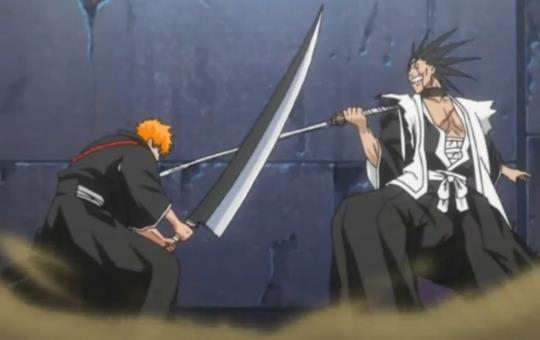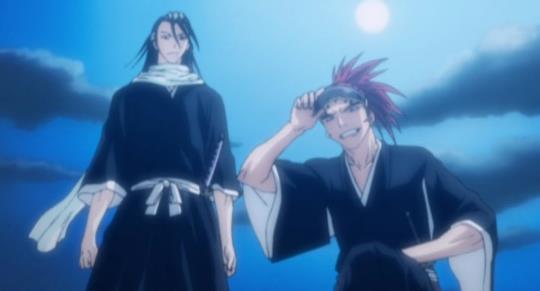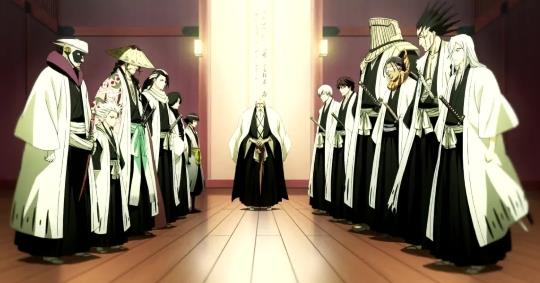Silver Screenings: Why Do I Return to Bleach?

I recall my first impression of Bleachbeing a rather negative one. The protagonist Ichigo seemed to suffer from what I exasperatingly called “The-One Syndrome”, wherein the show must pause every episode to inform you how great of a prodigy our protagonist was. The fictional characters stood in awe of his might while I yawned and rolled my eyes at the already well-worn archetype. This was great when I was in middle school and watching DragonBall Z every Sunday, but it wasn’t enough to hold my interest in College.
What baffles me is despite such a first impression I continued to watch anyway. I suppose when you’re failing and withdrawing from half your classes you suddenly have an abundance of time available. Even so, that I must have abandoned Naruto by this point makes it all the more confusing.
I persisted with Bleach throughout the Soul Society arc – the first sixty-some episodes – before finally giving up during the “Bounts” arc of filler. While I looked upon it more favorably than Naruto, I was ready to abandon the show completely as another shonen series that failed to learn from DragonBall Z’s mistakes. In hindsight, it’s more that Bleach had begun to create a whole new series of mistakes.
Years later I decided to return to Bleach upon news of the show’s cancellation. Perhaps I had grown curious as to what Aizen had been plotting all these years later. Beginning fresh once again, the Soul Society arc was incredibly addicting to watch while the following Bount arc was suffered only by the grace of binging through. In time, despite the superiority of the Arrencar arc to the Bounts, I was left feeling exhausted by the series. I once more abandoned Bleach.
Over the past few weeks I could not resist the compulsion to come back once more. Conversations with my brother might have sparked some positive memories. He had many a negative assumption, yet I felt as if there was something the show had that others did not. As a result, I returned once more to that very first episode, latched onto Soul Society once more. Why? What is so compelling about Bleach that keeps me coming back while Naruto rots in the dumpster of my memory?
The answer, I think, lies in episode sixteen. While the show’s characters are endearing enough, never is the story truly captivating until Abarai Renji and Byakuya Kuchiki show up to arrest Rukia. It is here that we get our first taste of danger for the characters, as Uryu Ishida is brought to his knees and, in the following episode, Ichigo finds himself outmatched and bleeding out. In none of the preceding fifteen episodes does anyone feel properly in danger. The protagonists win every fight pitted against them.
In episodes sixteen and seventeen, they are utterly defeated.

This is what I’ll call the first “spike” in the narrative, and also the first moment where we get to experience Ichigo as something more than a typical shonen protagonist. In his video regarding the Fall of Bleach, Super Eyepatch Wolf claims to have no idea who Ichigo is based on what he wants. Wolf’s claim that Ichigo is completely reactionary is accurate, but for the first arc I think that is actually in his favor. One of the reasons Naruto as a character annoyed me was because his goals were often the product of a frustrating and unearned conceit. Asta of current anime Black Clover is everything wrong with shonen protagonists, both in his conceit and… well, in his everything.
This arc we see Ichigo begin developing fear. He runs away because he’s not convinced he’s the strongest guy. He’s not weak, but his actions are driven first by a desire to protect rather than some childish notion to be the best. This is all we need the character to be for the first arc, and it certainly helps us root for him when he responds to a new threat with terror.
Episodes fifteen and sixteen are the first of many “spikes”. Following Ichigo’s loss comes a mercifully brief training segment… well, brief in regards to how these long-running shonen series tend to go. It’s still roughly three or four episodes long, but it also introduces the logic to Ichigo’s “leveling up”. From here onward Ichigo will find himself defeated and nearing death. Each time he must find within himself – and his blade Zangetsu – a new strength with which to carry on. While this is nothing new for shonen anime – and is perhaps one of the most irritating tropes to be found within the genre – each opportunity also deepens the setting’s lore.
It takes the concept of going Super Saiyan and provides a narrative logic beyond “he’s just that bad ass”. Ichigo’s loss is also experience, and thus leveling up feels more earned and natural rather than granted by the divine will of the author.

This is both the benefit and the detriment to the Soul Society arc as a whole. While I like Ichigo well enough, he’s a simple character whose defining trait is his potential strength. He works best as an agent of change, forcing other characters to reflect upon themselves and face some much needed introspection. This is why Soul Society becomes such a fascinating arc, but does not immediately begin as such. The real draw here are the Thirteen Guard Squads, their Captains, and their Lieutenants. A colorful cast of characters that… well, frankly, they don’t really get along too well. There are plenty of connections between the different Lieutenants and Captains, but you find there are no unifying sets of morals or values that unite them. It is only the system itself that unites them, though they’ve each climbed the ranks for differing reasons. Some for duty and the greater good while others still for personal gain and ambition.
Despite these divisions there are also no clear lines between “good” and “bad”. Kenpachi is not a traditionally “good” character. He simply loves to fight, and as such will kill without hesitation or remorse. Many of the more honorable Captains dislike Kenpachi, and yet Kenpachi turns out to be the closest to an ally for our heroes as the arc nears its climax. He is not an antihero. He is closer to being a force of nature.
If Ichigo is the most important character in the Soul Society arc, it is only through his presence as a disruptor. His arrival to save Rukia challenges the laws and order of Soul Society. Harmony – the Wa – is shaken up. It is during this time that the different motivations and attitudes clash, approaching a breaking point threatening the status quo. Ichigo is strong, but it is not his strength that makes the story compelling.
It is for this very reason I keep returning to Bleach. At the very least it is the reason I return to Soul Society. Those first fourteen episodes are a rather rough watch as none of the characters are truly compelling on their own. Average teenagers develop mystical powers to fend off unseen monsters is a pretty common concept that needs a real emotional hook. It may take a while to reach such a hook, but ultimately it ends up being worth it roughly thirty episodes in.
Which, I think, is the real tragedy of Bleach. The second “spike” does not occur until around thirty episodes in, meaning it takes half of the arc to become really good. It is never able to maintain that degree of quality, but once you hit that halfway point you have the best narrative I’ve seen in a shonen fighting anime. Admittedly it is a genre I steered away from for a long time. After all, I abandoned Naruto and haven’t watched shows like Hunter x Hunter, nor have I gone back to some of the founding series like Saint Seiya. It is also too early to say for My Hero Academia.
Nevertheless, that second half of the first major arc is solid. It never becomes great, however, and much of what made Soul Society good is cast aside as Ichigo continues towards his fight with the Arrencar.
After a brief respite I’ll be returning to Bleach. I’m going to skip the Bounts and jump right into the Arrencar arc. I want to better understand where the show declines in quality and why. Similarly, I’ve actually gone ahead and added Naruto to my Netflix queue. Despite my negative recollections, I want to know what Bleach did so different, and I can only truly know that by going back and giving Naruto a second chance.
Regardless, I fully intend to purchase the Soul Society arc on Blu-Ray in time. Even if I never finish Bleach, and even if it isn’t enough to be a great show, I think the desire to return to this arc – to these characters – will always persist.


